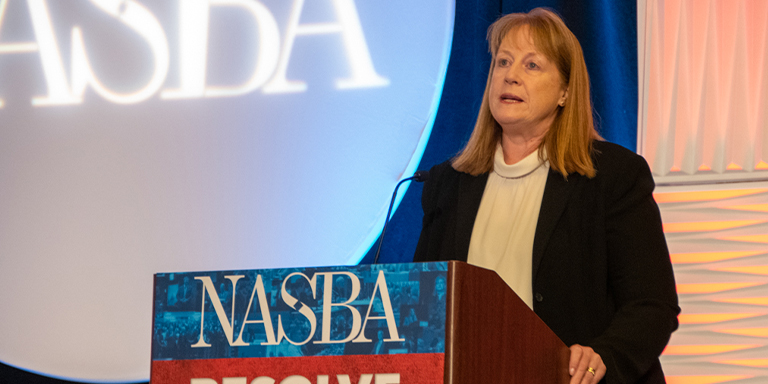SHARE: The Public Company Accounting Oversight Board will release standards for the use of big data and emerging technology — but not yet. They are still in the research stage, PCAOB Chief Auditor Megan Zietsman reported to the NASBA Annual Meeting. She explained that before the PCAOB develops any standards they want to do a deep-dive assessment to have a baseline and then determine the need for guidelines: “We are focused on how the tools are being used today, and then how we respond.” Many types of technology are being considered by the PCAOB including artificial intelligence, robotics, cryptocurrency, cloud computing and data analytics. The extent of their use varies among companies and auditors and the PCAOB is trying to determine if everyone “is talking about the same thing.” The PCAOB is looking at its current standards to see if they are impeding technology and if concerns can be addressed through guidance. Working with CPA firms and multiple PCAOB divisions, their study group has been looking at how firms are controlling the use of technology. They have also conducted outreach into the preparer community to see how technology is impacting internal controls as well as the preparation of financial reports. Late in 2017 the PCAOB had an 11-member task force do an inventory of the different types of technology being used. Data analytics and artificial intelligence were where they put most of their original focus. They found many issuers were in relatively early stages of using the technology. It was being used for traditional audit procedures, rather than completely new or transformative tasks, with few were using technology to enhance client experience. Data analytics was being used in auditing for risk assessment. “Firms said they are being very careful in how they are implementing new tools,” Ms. Zietsman reported. They were using private company space before rolling tools into public company practice and the national office was controlling the use of these tools. Development was going on in the larger firms. Firms told the PCAOB that its standards were not impeding their innovation of technology. “We recognize the need for standards to evolve with technology. We also hear caution that standards must still work with the more traditional audit methods. We have been deliberate and careful in our actions,” Ms. Zietsman stated. The PCAOB has continued to validate its standards, working with firms and task forces, and there is evolving information on how data analytics is being used. The activities of other regulators, such as IFIAR and IAASB, are being monitored by the PCAOB to avoid creating difference just for the sake of being different. In addition, it is following academic research and activity in this area, with the PCAOB hosting two annual events with the academic community. This year the PCAOB is looking at cryptocurrency and blockchain, working with the AICPA and CPA Canada, Ms. Zietsman reported. As the Board continues with its studies, its priorities may shift. “Audit firms want to be leaders in this space and to leverage technology to reduce costs, but I think the risk of costs for developing tools may not be clear to all stakeholders,” Ms. Zietsman said. While costs may go down as junior staff is replaced with tools, there will be a need for more experienced staff to analyze the results. “We are thinking about how to use data technology for all. It may challenge smaller firms, but that is not really the case because they will be able to use commercially available tools. However, they will have to use a quality product and understand what the tool does.” Ms. Zietsman said the PCAOB wants to actively engage in conversations with auditors and others who are using tools. |

